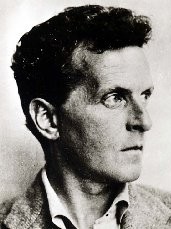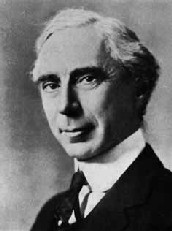
What Wittgenstein Saw and Russell Missed
Research Seminar • University of London • Autumn 2006
Convenor : Josť Zalabardo, UCL (j.zalabardo@ucl.ac.uk)
Tuesdays 10:00-12:00 at the Institute of Philosophy, Room ST273

 |
What Wittgenstein Saw and Russell MissedResearch Seminar • University of London • Autumn 2006Convenor : Josť Zalabardo, UCL (j.zalabardo@ucl.ac.uk)Tuesdays 10:00-12:00 at the Institute of Philosophy, Room ST273 |
 |
In a letter to his lover, dated 28 May 1913, Russell gives the following remarkable account of a meeting with Wittgenstein:
We were both cross from the heat. I showed him a crucial part of what I had been writing. He said it was all wrong, not realizing the difficulties—that he had tried my view and knew it wouldn't work. I couldn't understand his objection—in fact he was very inarticulate—but I feel in my bones that he must be right, and that he has seen something that I have missed. If I could see it too I shouldn't mind, but as it is, it is worrying, and has rather destroyed the pleasure in my writing—I can only go on with what I see, and yet I feel it is probably all wrong, and that Wittgenstein will think me a dishonest scoundrel for going on with it. Well, well—it is the younger generation knocking at the door—I must make room for him when I can, or I shall become an incubus. But at the moment I was rather cross.
Three years later he wrote that Wittgenstein's criticism was
an event of first-rate importance in my life, and affected everything I've done since. I saw he was right, and I saw that I could not hope ever again to do fundamental work in philosophy. My impulse was shattered, like a wave dashed to pieces against a breakwater.
What Russell had been writing was a book manuscript that he began 7 May 1913. He wrote 350 pages in thirty-one days, but he seems to have abandoned the project after that, and never returned to it. The existence of this manuscript was not known until 1967, and its importance for the understanding of Wittgenstein's early work was not appreciated until the 70's. It was published in 1984 under the title Theory of Knowledge. The 1913 Manuscript, as volume 7 of Russell's collected papers.
The theory of representation put forward in the Tractatus constitutes Wittgenstein's solution to the problems that he found in the theory of judgment (or understanding) that Russell was trying to articulate in the 1913 manuscript. I regard this as the single most important lead for the interpretation of the Tractatus. The main goal of this seminar is to follow this lead as far as we can. I don't have any polished material to present on these topics. I see the seminar as a collective effort.
I propose to undertake the following tasks:
Follow the evolution of Russell's views on the nature of judgment from 1903 to 1913
Trace the presence of these views in Wittgenstein's pre-tractarian writings
Examine the ideas of Frege's that might have inspired Wittgenstein's alternative to Russell's views
Consider how the theory of representation presented in the Tractatus seeks to overcome the difficulties faced by Russell's position
Bertrand Russell. The Principles of Mathematics. Cambridge: Cambridge University Press, 1903. [Chapter 4]
Bertrand Russell. "On the Nature of Truth and Falsehood." In Philosophical Essays, 147-59. London: Longmans, Green, 1910.
Bertrand Russell. The Problems of Philosophy. London: Williams & Norgate, 1912. [Chapter XII]
Bertrand Russell. "Theory of Knowledge: the 1913 Manuscript." In The Collected Papers of Bertrand Russell. Vol. 7, edited by Elizabeth Ramsden Eames and Kenneth Blackwell. London: Allen & Unwin, 1984. [Part I, Chapters VII and IX, and Part II, Chapters I and V]
Ludwig Wittgenstein. Notebooks, 1914-1916. Translated by G.E.M. Anscombe. 2nd ed. Oxford: Blackwell, 1979. [to page 71 and appendices I and II]
Ludwig Wittgenstein. Tractatus Logico-Philosophicus. Translated by David F. Pears and B. F. McGuinness. 2nd ed. London: Routledge, 1974. [mainly the 1s, 2s and 3s]
Background
F. H. Bradley. Appearance and Reality. London: Swan Sonneschein & Co, 1893. [Chapter III]
G. E. Moore, "The Nature of Judgement." Mind, n. s. 8 (1899): 176-93.
Leonard Linsky. "The Unity of the Proposition." Journal of the History of Philosophy 30 (1992): 243-73.
Peter Hylton. "The Nature of the Proposition and the Revolt against Idealism." In Philosophy in History, edited by Richard Rorty, J. B. Schneewind and Quentin Skinner, 375-97. Cambridge: Cambridge University Press, 1984.
Peter Hylton. Russell, Idealism, and the Emergence of Analytic Philosophy. Oxford: Clarendon, 1990. [pp.171-79, 333-61]
David Pears. "The Relation Between Wittgenstein's Picture Theory of Propositions and Russell's Theory of Judgment." Philosophical Review 86 (1977): 177-96.
David Pears. "Wittgenstein's Picture Theory and Russell's Theory of Knowledge." In Wittgenstein: the Vienna Circle and Critical rationalism; Proceedings of the Third International Wittgenstein Symposium, 13th to 19th August, 1978, edited by Hal Berghel, Adolf Hübner and Eckehart Köhler, 101-07. Vienna: Holder-Pichler-Tempsky, 1979.
David Pears. "Russell's 1913 Theory of Knowledge Manuscript." In Rereading Russell: Essays in Bertrand Russell's Metaphysics and Epistemology. Minnesota Studies in the Philosophy of Science; vol. 12, edited by C. Wade Savage and C. Anthony Anderson, 169-82. Minneapolis: University of Minnesota Press, 1989.
Nicholas Griffin. "Wittgenstein's Criticism of Russell's Theory of Judgement." Russell 5 (1986): 132-45.
Anthony Palmer. Concept and Object: The Unity of the Proposition in Logic and Psychology. London: Routledge, 1988. [chapter 4]
Hans Sluga. "Frege Against the Booleans." Notre Dame Journal of Formal Logic 28 (1987): 80-98.
Stewart Candlish. "The Unity of the Proposition and Russell's Theories of Judgment." In Bertrand Russell and the Origins of Analytical Philosophy, edited by Ray Monk and Anthony Palmer, 103-35. Bristol: Thoemmes Press, 1996.
Herbert Hochberg. "Propositions, Truth and Belief: The Wittgenstein-Russell Dispute." Theoria 66 (2000): 3-40.
Colin Johnston. "The Unity of a Tractarian Fact." Synthese (forthcoming).
[Items listed here will be placed in a folder in the UCL Philosophy Department library]
DATE |
READING |
|---|---|
| 10 October | Linsky, "The Unity of the Proposition" |
| 17 October | Russell, The Principles of Mathematics, chapter 4 |
| 24 October | Russell, The Principles of Mathematics, chapter 4, §§ 52-55. |
| 31 October | Russell, "On the Nature of Truth and Falsehood" —, The Problems of Philosophy, chapter 12 —,"Theory of Knowledge: the 1913 Manuscript." Part I, Chapters VII and IX, and Part II, Chapters I and V Stewart Candlish, "The Unity of the Proposition and Russell's Theories of Judgment" |
| 14 November | Russell,"Theory of Knowledge: the 1913 Manuscript." Part I, Chapter IX, and Part II, Chapters I and V |
| 21 November | Wittgenstein, "Notes on Logic" and Notebooks (mainly entries from
from 13 October to 1 November 1914.) |
| 28 November | Frege, "Function and Concept" and "On Concept and Object." |
| 5 December | Wittgenstein, Tractatus, 1's, 2.0's and 3.31's. |
| 12 December | Wittgenstein, Tractatus, up to the 4.0's |